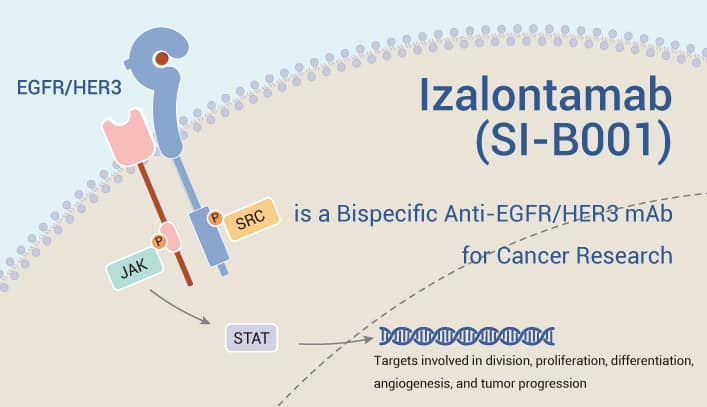EGFR (epidermal growth factor receptor) is a member of the ErbB receptor family1. Besides, EGFR is a common therapeutic strategy in epithelioma such as lung adenocarcinoma, colon cancer, head and neck cancer, and esophageal cancer, where the over-expression of EGFR caused by gene mutation plays an essential role in tumor progression. HER3 (human epidermal growth factor receptor 3) is a membrane-bound protein that in humans is encoded by the ERBB3 gene. Importantly, HER3 as a heterodimerization partner, most critically with ErbB2, is implicated in growth, proliferation, chemotherapeutic resistance, and the promotion of invasion and metastasis.
Tumors that are initially sensitive to anti-EGFR therapy often develop resistance owing to complicated mechanisms. Partially, HER3 both of which belong to the ErbB receptor family may overcome the resistance of anti-EGFR treatments.
In this article, we will introduce a bispecific anti-EGFR/HER3 monoclonal antibody, Izalontamab.

Izalontamab (SI-B001) is a bispecific anti-EGFR/HER3 monoclonal antibody with high selectivity for EGFR/HER3 heterodimer. Besides, In a PK study, Izalontamab (25 mg/kg; i.v.; once) shows suitable pharmacokinetic parameters with CL of 0.804 mL/kg/h, Vmax of 50.1 μg/kg/h in female NOD/SCID mice (SW48, FaDu and KYSE-150 xenografts). In addition, Izalontamab (10, 30 mg/kg; i.v.; once) also shows suitable pharmacokinetic parameters with CL of 0.19 mL/kg/h, Vmax of 40.1 μg/kg/h in cynomolgus monkeys. Moreover, Izalontamab (10, 25, and 46 mg/kg (SW48); 5, 10, and 25 mg/kg (FaDu and KYSE-150); Intravenous injection; every 7 days once, 4 doses in total) inhibits the growth of FaDu and KYSE-150 tumors at the dose of 10 mg/kg, shows 63.6% SW48 tumor growth at the dose of 46 mg/kg.
All in all, Izalontamab is an EGFR/HER3 Bi-specific monoclonal antibody. Besides, Izalontamab has the potential for research on cancer.
Reference:
[1] Xue J, et al. J Pharm Sci. 2020 Oct;109(10):3172-3180.